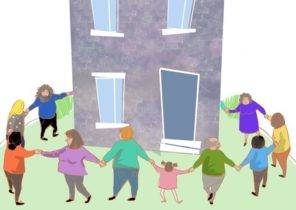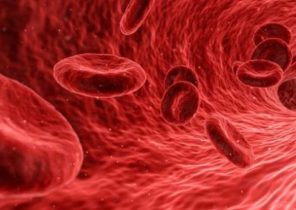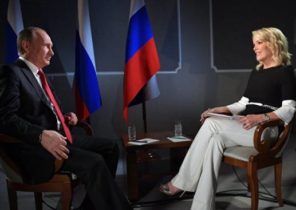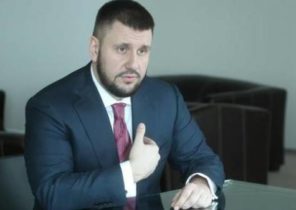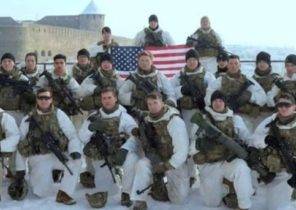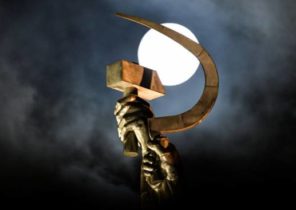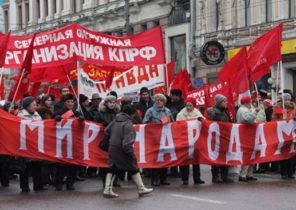The tool for the demonstration of legitimacy
May 7 will mark the 20th anniversary of the first inauguration of Vladimir Putin. The spread of the novel coronavirus gradually driving him to a standstill. And a referendum on constitutional amendments scheduled for 22 April, and a military parade, which was held on the Day of Victory over Germany may 9, had to be postponed.
The epidemic quickly spread in April, has not yet reached its peak. However, as soon as coronavirus chaos calms down a bit, most likely, will be immediately determined by the date of the referendum. The current term of office of President Putin to expire in 2024. If the amendments to the Constitution are adopted, the head of Russia will be able to run for a fifth term, however, the meaning of the referendum is not just that.
With the third term after the financial crisis of 2008, economic growth was a maximum of 2%. In 2014 it was annexed Ukrainian Crimea and Russia broke out feelings of patriotism, but the US and the EU imposed sanctions, so the real incomes of Russians continue to decline.
Due to the increase in the retirement age two years ago, Putin’s rating has fallen from 80% to 60%. The Russian leader was faced with the need to revive the system. Therefore, a referendum is not required for amendments to the Constitution.
Stability in Russia maintained with the participation of Putin, who corrects the interests of the army, law enforcement, economic officials and oligarchs. This structure is based on absolute trust of the people. Meanwhile in the presidential elections is not fair competition. Political enemies eliminated, and the other candidates do not stand a chance to win the election.
Election, and the referendum is a vote of confidence to Putin. They need only to show the legitimacy of the government.
After the Soviet collapse, Russia has sought to party politics, despite the clash of interests of politicians and oligarchs. The Putin administration has used elections as the basis of democracy, and moved on to authoritarianism. During the first term of the ruling party became exaggerated. Erased the boundaries between the government, Parliament and the courts. This was made possible thanks to the support of the people, economic growth caused by rising oil prices and the memory of the turmoil of the 1990-ies.
Other countries in the Wake of authoritarianism
However, in recent years, the authorities go to extreme measures to artificially raise the rating.
During the Ukrainian crisis was stimulated by accumulated over many years, the feeling of inferiority of the people who perceive themselves as losers in the cold war. During the presidential election in 2018 managed to achieve a record rating on the background of economic stagnation thanks to the full mobilization of administrative resources and the media and public exposure: “it is Necessary to vote for Putin to confront the West, which is held against Russia’s policy of deterrence.”
The current draft of the amendments to the Constitution were included to support the education of children and other populist items as well as Patriotic article. “Putin isolated public opinion in Russia from the rest of the world”, — said the head of the Department for socio-cultural research of “Levada-center” Alexei Levinson.
In other countries, the authoritarianism that uses the maximum elections and other democratic procedures, it also undermines the Foundation of democracy on the background of protracted finding Putin to power.
Turkish President Recep Tayyip Erdogan in 2000, won in Parliament, as Prime Minister. In 2014 he became President and concentrated power in their hands due to the amendments to the Constitution. The Prime Minister of Hungary Viktor Orban, starting in 2010, three times won a landslide victory in parliamentary elections. He proclaimed “illiberal democracy” and have threatened the independence of the courts and the media.
On the background of the problem of refugees and an epidemic of a new coronavirus the unity of the EU is shaken largely because of the concerted actions of Poland and Hungary, which took a course on authoritarianism.
In addition, after the annexation of Crimea, Russia intervened in the election of the American President in 2016 and has started to cooperate with right-wing populist forces in Europe. So she shook the different countries.
Signed a cooperation agreement with “United Russia” “Austrian freedom party” and the Italian “Northern League” at one time been part of the government. Russian state media, who have offices in different countries and help the populist forces in the native language concerned local authorities.
European populists who attack the traditional politicians and the elite, positioning them as privileged classes, and Putin is uniting the privileged classes of Russia are in different positions. However, what unites them is what they perceive “the people” as an absolute measure and downplay the idea of separation of powers.
During last year’s interview with the British Financial Times, Putin emphasized that liberalism is contrary to the interests of most people. Liaison with the European populists is the inverse of measures to strengthen support in Russia.
Japan first went to the rapprochement
The result of the Ukrainian crisis, Western countries have expelled Russia from the “Big eight” and demanded to stop violating the world order. However, because of the surface treatment by the administration of the tramp to the Union anti-Russian coalition collapsed.
The Prime Minister of Italy, Giuseppe Conte insists on the abolition of the EU sanctions against Russia. In June last year, the Council of Europe which includes 47 countries in favour of human rights, restored the voting rights of Russia on the initiative of France, despite the complete lack of progress on the Ukrainian issue.
European governments can’t do nothing with the growing social stratification. They have to make overly focused on the internal situation of the policy, which insists populists. Economic ties with energy supplier — Russia — is strong, and when disturbed coherence, to the fore their own interests.
Japan was the first who went for relief in respect of the Kremlin. On the one hand, Prime Minister Shinzo Abe acts consistently in the field of anti-Russian sanctions, on the other, develops the peace Treaty negotiations, relying on personal relations with Putin. Nevertheless, the heads of Russia who cares only about public opinion in the country, there was no way to move the territorial problem from the dead point.
The pandemic covid-19 and the collapse of oil prices, the prospects of Putin’s administration have become increasingly vague. If the Russians even more removed from power, there is a danger of further increasing authoritarianism in an attempt to curb these trends.
